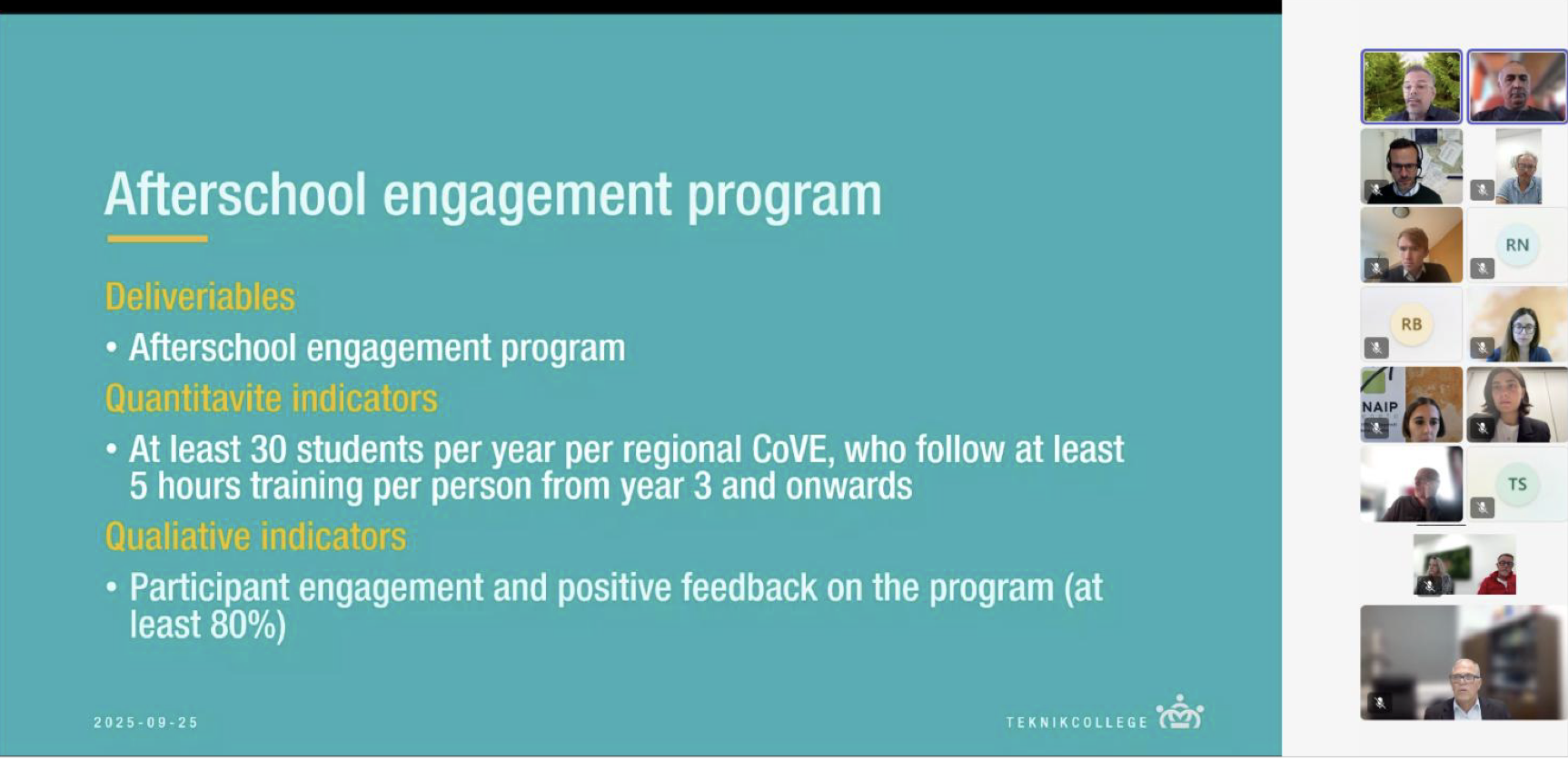WP3 CoVE – Afterschool programs Agenda
Project: CoVE STEM EUROPE
Date: 25 September 2025
Location: Microsoft Teams – (Online Meeting)
Organized by: Teknikcollege -Johan Ståhl (WP3 Leader)
-----------------------
The second Work Package 3 meeting focused on enhancing after-school STEM programs across Europe, with new members Matthew Coates and Skender Avdiji introducing themselves and their roles.
Johan Ståhl recapped previous discussions on adapting after-school initiatives to local contexts and emphasized the importance of sharing best and worst practices among participants. Upcoming deliverables were outlined, including a paper on after-school engagement programs due by January 2026. Participants were encouraged to share insights on the challenges and opportunities they face in implementing these programs in their regions.

Photo during the on-line meeting 25.09.2025
Johannes Böhmer presented the ZDI/ZDE initiative in North Rhine-Westphalia, which supports hands-on STEM education through local networks and funding for After Sschool programs. He highlighted the significance of a strong network structure and collaboration between public and private stakeholders. Discussions also covered the pre-vet education program targeting students from grade 7 to high school, with inquiries about recruitment and success measurement.
Ståhl shared details about Technica Sweden's After Schools program, particularly the "Technology for Girls" initiative aimed at increasing female participation in STEM. Carla Spagnolo and Teresa Salvino discussed the need for a common template for mentorship programs in Italy, while other participants shared their regional challenges and opportunities for collaboration in vocational education.
The meeting agenda included a recap of the last meeting's discussions on after-school programs, emphasizing the importance of adapting these programs to local needs. Participants were encouraged to share obstacles and opportunities related to the establishment of after-school programs in their regions.
• Introduction of new participants and their roles in the project.
• Planning for future meetings and deliverables related to after-school programs.
• Overview of Work Package 3 and its focus on after-school programs.
Key Success Factors of After-School Programs
Johannes Böhmer discussed the success factors of after-school programs, noting the importance of a long-term network structure and a bottom-up approach that prioritizes local needs. He emphasized the role of public-private cooperation, especially with labor market stakeholders, in enhancing program outcomes. Additionally, he mentioned the variety of innovative formats that promote hands-on activities, which help build students' confidence in pursuing STEM careers.
Overview of Pre-Vet Education Program
Johannes Böhmer explained that the pre-vet education program is designed for students from grade 7 until high school graduation, with a focus on job orientation. Gultekin Cakmakci questioned the age range of students, and Rickard Bäck raised concerns about recruitment methods and tracking student success post-program. Böhmer clarified that recruitment is a mix of voluntary participation and school collaboration.
After School Programs and Gender Focus in STEM Education
Johan Ståhl outlined the After Schools program in Technica Sweden, emphasizing its regional autonomy and focus on girls in STEM. He introduced the "Technology for Girls" program, which offers a two-week summer experience for eighth-grade girls, funded by Volvo and SAAB, and includes hands-on STEM activities. The program has seen high interest, with 60 to 70 applicants for 22 spots each year.
Status Update on Mentorship After-School Program
Carla Spagnolo discussed the challenges and opportunities in establishing a mentorship after-school program in Italy, advocating for a common template to streamline efforts across the partnership. Teresa Salvino echoed this sentiment, noting the necessity for guidelines that cater to their unique demographic, including migrant children. Gultekin Cakmakci from Turkey suggested leveraging existing networks for collaboration and defining what constitutes after-school programs to enhance participation. Xhevdet Thaqi explained that since February, the UKZ team has been working intensively on the launch of two new study programs in the STEM field. This process has already passed its first stage, and is expected to be successfully finalized so that, starting from September 2026, we can welcome the first cohort of students. Our goal is to involve these students - enrolled in the study programs Mathematics and STEM and Electro-Automatic Engineering - in the activities of the STEM EUROPE project. We strongly believe this will be possible.
 Formerly co-funded by the Erasmus+ Programme of the European Union
Formerly co-funded by the Erasmus+ Programme of the European Union